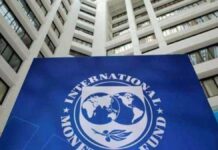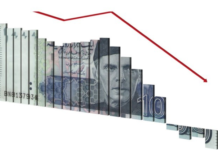
LAHORE: A report released by Fitch Solutions has said that Pakistan economic growth will slow down over the coming quarters and projected it to be 5.4% for FY19 compared to 5.8% in FY18.
It said, “We believe that further austerity measures will likely exacerbate the cyclical slowdown in the Pakistan economy.
However, that is not to say that in the absence of the IMF-induced austerity, Pakistan will be able to sustain its current growth momentum.
Pakistan has been living beyond its means for several years now as evident from the widening current account and trade deficit, which is unsustainable.
While the surge in imports has been partly due to the CPEC investment, many of the projects have questionable commercial viability.”
In a comment to Profit, Pak Kuwait Investment Co AVP Research Adnan Sheikh said, “Surprising thing between Fitch Solutions recent report and Fitch Ratings 3Q APAC credit overview is that Fitch ratings estimate GDP growth to slow to 5.0%, while Fitch Solutions is more optimistic and expects growth to slow to only 5.4%, a 40bps discrepancy between the rating agency and the macro research provider.
However, there is no new content or insights in the Fitch Solutions report, most of it is already given.”
According to Mr Adnan, it’s not the first time Pakistan is approaching the IMF, and Fitch clearly highlights this by stating “usual fiscal austerity and monetary tightening measures.”
“Further, the statement that “we believe that any deal is unlikely to put an end to the fiscal mismanagement”, is clearly based on the experience of past IMF programmes and their repeated outcomes.
We as a nation clearly haven’t learned from them and Fitch highlights this by correctly stating that Pakistan has been living beyond its means,” he added.
According to Fitch, it was likely to clinch a deal with the International Monetary Fund (IMF), permitting it to avoid default and a currency crisis.
Fitch said it believed any deal is unlikely to put an end to the fiscal mismanagement that routinely necessitates external bailouts.
“The requested loan amount has not been confirmed but the government has reportedly asked for a bailout of between $6.0-7.0 billion.
Saudi Arabia has already committed $6 billion to Pakistan in October, but the country will need more than that to tide the economy over for any length of time.
To put the figure into context, Pakistan’s imports amounted to USD4.8bn in October, and a USD13bn bailout package would amount to less than 3 months of import cover,” said Fitch Solutions.
Moreover, it said the key question is on what terms would Pakistan receive this assistance and what short-term impact this would have on the economy.
To secure an IMF bailout, the main prerequisites would be anti-money laundering, anti-corruption commitments and privatisation, said Fitch Solutions.
It added for gaining access to IMF funds, a presentation of a complete anti-money laundering strategy and a framework for decreasing corruption is among the conditions.
“Pakistan was placed on the Financial Action Task Force’s (FATF) grey list in June, but the global financial watchdog expressed dissatisfaction at a review in October with what it called ‘inadequate measures’ Pakistan has taken to curb terror financing and fix anti-money laundering laws,” said Fitch.
Moreover, Fitch said the IMF was wary about the lack of transparency surrounding Pakistan’s burgeoning liabilities to China relating to the China-Pakistan Economic Corridor (CPEC).
It added, “It seems likely that the agreement will take a similar form as the previous $6.4bn Extended Fund Facility (EFF) in 2013, whereby the IMF required the government to privatise loss-making public-sector entities (PSEs).”
The previous bailout agreement reached by the PML-N administration in 2013 included privatisation as a key prerequisite, however, the much-vaunted privatization drive largely failed to take-off.
It explained that besides the demand for privatisation, the IMF would ask the Pakistani authorities to increase interest rates, widen the tax base, raise power tariffs and depreciate the rupee.
These demands had been agreed upon for the previous bailout, but were met partially, said Fitch.
Fitch observed that Pakistan was reluctant to heed to various of the IMF’s terms and conditions, but as per their view, an eventual IMF bailout agreement is likely.
It highlighted that “Pakistan has reportedly informed the IMF delegation that Prime Minister Imran Khan’s government has finalised its privatisation plans.
However, the plans do not include the sale of Pakistan Steel Mills (PSM) or Pakistan International Airlines (PIA), among other loss-making behemoths.
Moreover, sources at the finance ministry said that the government will share only data related to the CPEC with the IMF and not the framework agreement signed between Pakistan and China.”







What does 5.4% GDP mean to any one without an actual associated GDP figure?
Comments are closed.